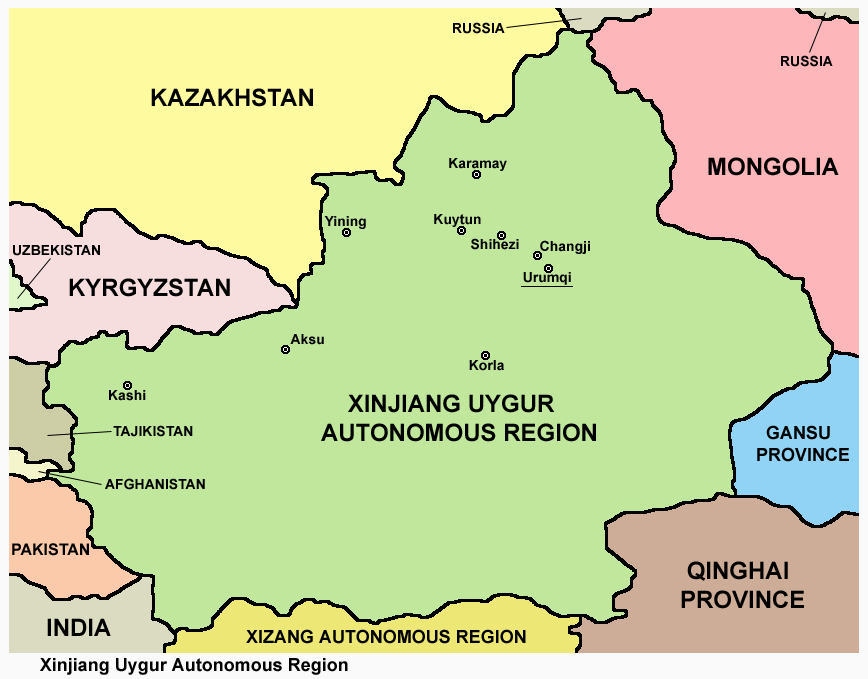German companies help forced labor in China?

How German companies doing business with China's Xinjiang region operate, according to the European Center for Constitutional and Human Rights (ECCHR). Pierluigi Mennitti's article
German companies targeted by human rights associations for alleged business in China. At the expense of the Uighurs, the Islamic minority repressed by the Beijing authorities. The alarm came from the European Center for Constitutional and Human Rights (ECCHR), an independent non-governmental organization, which filed a complaint against clothing companies and individual German retailers at the Karlsruhe Public Prosecutor's Office, as exclusively reported by the Süddeutsche Zeitung .
The accusation is heavy: "Aiding and abetting crimes against humanity in the form of enslavement through forced labor". In essence, it is a question of shedding light on the activity of a number of German companies in China, and in particular on the commercial relations maintained by them in the western region of Xinjiang.
In this area, on the border with Kazakhstan, human rights activists denounce the existence of re-education camps for hundreds of thousands of Uighurs, forced in the three months between September and November to collect cotton in the fields mostly by hand and against their will. Experts estimate up to half a million forced laborers and speak of the largest internment system of an ethnic or religious minority since the Second World War. Instead, the Chinese government has always denied the existence of forced labor in Xinjiang, speaking rather of training and work programs to combat extremism in the region.
The Munich newspaper reports the suspicions of Miriam Saage-Maaß, international lawyer of the European Center: "If in such a situation German companies continue to award contracts to companies that have production plants in Xinjiang, the question arises whether this is not promoting forced labor ". For Saage-Maaß now the ball passes into the hands of the judicial system: "It is his job to investigate and clarify the matter." However, it is not yet certain that the General Prosecutor's Office will find in the ECCHR's complaint the elements necessary to start the criminal investigation.
The complaint, however, ended up on the table of the reporters of the Süddeutsche and of the investigative journalism program “Report Mainz” of the regional public television SWR and from the judicial secrecy a first none – excellent – emerged: Lidl. From the list of its suppliers, it appears that the discounter "has had relations with three textile companies based in Kashgar, in southern Xinjiang", reports the Bavarian newspaper, "and it is said that at least two of these companies have employed former prisoners of re-education camps and therefore actively supported the policy of the Chinese apparatus in Xinjiang ”.
When asked for clarification, the German discounter replied through its press officers that it had ceased all employment relationships with two of the indicted companies "for over a year" and with the third "since the end of June". Which indirectly confirms that relationships in the recent past have existed.
The Süddeutsche recalls that suspicions about the possible employment of forced laborers in Xinjiang camps have been circulating for at least three years, that in 2019 the Fair Labor Association had expressly reported such risks and that in December 2020 it had prohibited its members from obtaining raw materials, supplies operational or finished products from the region due to the high risk of forced labor.
The American political authorities have also moved in this direction. In July 2020, the U.S. Department of Commerce blacklisted individual companies operating in Xinjiang, and in January 2021, the government subsequently imposed a blanket ban on cotton imports from the region. "Only five months later Lidl stopped doing business in the region," notes the Bavarian newspaper.
For the judiciary, however, a simple job is not announced. This was confirmed by an expert consulted by the Süddeutsche, the sinologist Björn Alpermann of the University of Würzburg, who for years has been engaged in research on the conditions of exploitation in Xinjiang. It is extremely difficult to demonstrate compulsion for individual supplier companies, as the European Center for Constitutional and Human Rights is trying to do, says Alpermann, who was also able to view the complaint filed by ECCHR. "In none of the reported cases can I find crystal clear evidence of forced labor," he adds, but there are "many suspicious factors that should be investigated."
It is unclear how many German and international textile companies still source through Xinjiang-linked supply chains, the Munich newspaper concludes, as only a few companies actually publish their delivery lists. This means that the attention of public opinion is destined to focus only on those that do and that are more transparent than others, inevitably leaving out a gray area that could be very large. On the judicial side, however, it is primarily up to the Attorney General to decide whether to investigate the complaint or to file it.
This is a machine translation from Italian language of a post published on Start Magazine at the URL https://www.startmag.it/mondo/aziende-tedesche-cina-xinjiang-lavoro-forzato/ on Mon, 06 Sep 2021 10:56:14 +0000.
